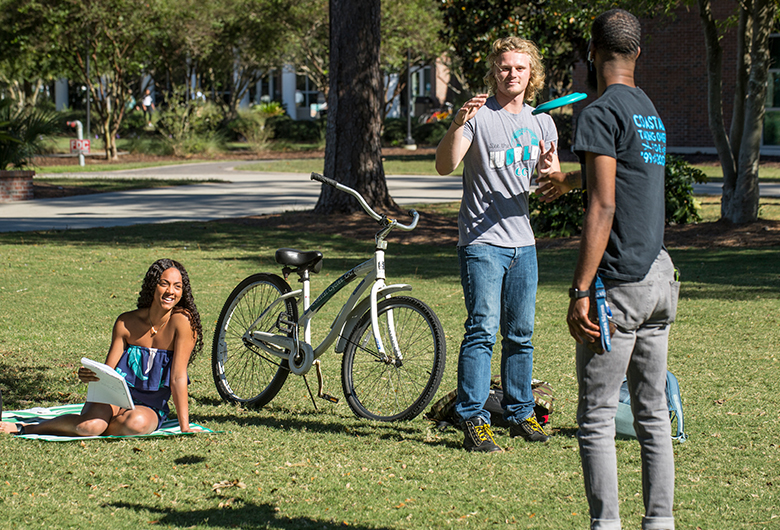Login to your International Student Portal to request work permission via CPT or OPT. Visit the "Request Center" in your portal to start your request.
Questions about employment? Contact the ISSS team.
- International Student and Scholar Services
- Email: internationalservices@coastal.edu
- Phone: 843-349-2053
- Physical Address:
Kearns 207
CCU's Career Services team can help students with:
- Resumes
- Interview Prep
- Job Searches
- Learning how to negotiate job offers
- and more
Please visit their webpage for more information or to schedule an appointment. https://www.coastal.edu/career/ CCU Career services are available for life for all students and alumni!
Curricular Practical Training (CPT)
Curricular Practical Training (CPT) is work training that is an integral part of an established curriculum, this includes: “alternate work/study, internship, cooperative education, or any other type of required internship or practicum which is offered by sponsoring employers through cooperative agreements with the school.” CPT is available only prior to the completion of a degree program and the student must have a job offer for CPT at the time of application. CPT employment may not delay completion of the academic program.
You may request CPT through your International Portal under the Request Center.
- Summer (internship course enrollment can be in any of the summer terms)
- Earliest Date: First day of classes for Maymester
- Latest Date: Last day of final exams for Summer II
Note: Exceptions may be possible within clear, academically based parameters and require prior approval by the department and by a DSO. The start date cannot be before the end of the previous semester without enrollment in an internship course in that semester. Authorization cannot extend beyond the end of the semester unless CPT and related enrollment will continue in the subsequent semester.
Application Procedure
CPT Applications should be submitted as early as possible and at least two weeks prior to the intended employment start date. Employment cannot begin before the CPT is authorized in SEVIS.
Step 1 - Prepare the following documents:
- Self-Service printout of your class schedule showing enrollment in internship credits
- Offer of employment written on the company's letterhead, addressed to you, and including the following information:
- Name of company
- Employment address (street, city, state, and zip code)
- Job title
- Job description
- Number of hours expected to work each week
- Exact dates of CPT employment
- Supervisor’s name and contact information
Step 2 – Submit the CPT Request Form in your CCU International Student Portal
-
- You will be asked for contact information for an "Approver" in the CPT Request in your International Student Portal account.
- This should be your internship coordinator or an advisor that has knowledge of your program, the internship course, and the position.
- They will be asked to confirm that the course will meet a degree requirement and that the position is directly related to your major.
- They will automatically be sent an email when you submit your request. They will access the request and make the confirmation directly in your portal account.
- You will be asked for contact information for an "Approver" in the CPT Request in your International Student Portal account.
Step 3 – Once your application has been approved by a DSO, your new CPT I-20 will be created. You will receive an email when your CPT I-20 is ready to access from your CCU International Student Portal.
For Departments hiring an international student who needs a Social Security Number:
Please complete and sign section 1 of our SocialSecuityNumberEmploymentVerification and send it back to the student to submit in their "Request for an SSN letter" in their International Student Portal account.
For Employers:
If you are an employer interested in hiring an international student and have questions, please contact our office via email at internationalservices@coastal.edu.
For more information on H1-B please visit: https://studyinthestates.dhs.gov/students/complete/h-1b-status-and-the-cap-gap-extension
Academic Training
J-1 students who plan to complete an internship may request Academic Training. Please contact our office at internationalservices@coastal.edu for more information.
Students are not required or expected to work while they are attending a college or university in the United States. Working on campus is permitted for non-citizens on student visas without special permission from the Department of Homeland Security, U.S. Citizenship, or the Department of State.
International students can work on campus for up to 20 hours per week during the regular semester. International students on student visas are not authorized to work off campus unless authorized through the Center for Global Engagement or the United States Citizenship & Immigration Services.
F-1 students do not need any special authorization to work on-campus. J-1 students must be authorized for on-campus employment in their J-1 SEVIS record. J-1 students can contact the office at internationalservices@coastal.edu for more permission.
Optional Practical Training (OPT)
Optional Practical Training (OPT) is temporary employment authorization available to F-1 degree-seeking students after completion of all course requirements for the degree listed on their I-20 (excluding thesis). Upon approval from USCIS, a student can work for an initial period of up to 12 months.
STEM OPT
F-1 students approved for standard post-completion optional practical training based on a degree in a STEM (science, technology, engineering, mathematics) field that appears on the DHS STEM-Designated Degree Program List can apply to USCIS for a one-time 24-month extension of post-completion OPT (for a total eligibility of up to 36 months).
You may request OPT through your International Portal under the Request Center.
What are taxes?
“Americans and others residing within this country must pay taxes to the state and federal government, and the process is completed through an agency called the Internal Revenue Service, or the IRS. Usually when someone earns money a portion of it is automatically deducted and sent directly to the government. Organizations that pay individuals send a summary of how much money they paid you every January or so, as well as how much of that was sent to the government. The purpose of filing your taxes is to report all your sources of income to the government, what you already paid, and what you still owe. It is also an opportunity to claim deductions or exemptions you may qualify for. At the end of the process, you calculate how much in total you should have paid. If you paid more than what you owe during the year, you get a refund. On the other hand, if you didn't pay enough, you have to pay the difference.”
Source: http://www.internationalstudent.com/tax/
What are international students required to do?
1.File Form 8843 “Statement for Exempt Individuals and Individuals with a Medical Condition.” This form is for individuals who have no income. Check with the VITA volunteer for further details, but generally this means that you did not work in the U.S. or have a scholarship that pays tuition ONLY. You do not need a Social Security Number (SSN) or an Individual Taxpayer Payer Identification Number (ITIN) to submit Form 8843.
2. File federal and state income taxes. Most students who have had employment in the U.S. or who have other taxable income need to file federal and state income taxes. This includes students who receive a CCU scholarship for purposes other than tuition such as housing, food, and textbooks. You must have an ITIN or SSN in order to file your taxes.
Individual Taxpayer Identification Number (ITIN) vs. Social Security Number (SSN)
An ITIN is a number given to you by the Internal Revenue Service (IRS) used to identify you for tax related purposes. A SSN is required of students who work in the U.S. on-campus or for CPT or OPT. You can only apply for an SSN if you have an offer of employment. Once you receive your ITIN, please take a copy of your ITIN letter to the payroll office. SSN’s should be reported to the Office of the Registrar. Reporting you ITIN and SSN to CCU ensures your CCU tax documents are prepared properly.
You can request a SSN through your International Student Portal in the Request Center.
The Volunteer Income Tax Assistance (VITA) Program IRS certified volunteers offer FREE tax assistance.
For more information on VITA: http://www.coastal.edu/business/vitataxservice/
Documents to Bring to the VITA session:
I-20 or DS-2019
- Unexpired Passport
- Most recent F-1 or J-1 Visa (even if expired)
- Any tax forms you receive (W-2, 1042-S, etc.)
- Information about scholarships
- Social Security Number (SSN) or Individual Taxpayer Identification Number (ITIN)
- Your U.S. bank account number and routing number, a blank check, or a direct deposit form from your bank. You can have the IRS mail a refund check to you, but it will take longer to receive a refund.
Be sure you know the following information:
- Your employer’s contact information
- All U.S. travel history
- Get your travel history with your I-94 at https://i94.cbp.dhs.gov. Click on the “Get Travel History” button.
- Your local physical AND mailing address (if different)
Do you need help with taxes outside of the VITA operating hours?
After the VITA program ends or if you are outside of the U.S., online tax services available for a fee. In most instances, you will not be able to use the same tax software (e.g. Free File, Turbo Tax, Tax Act, etc.) as U.S. citizens.
- Federal Taxes Only: Glacier Tax Prep: https://www.glaciertax.com/ (Federal taxes only)
- Federal and State Taxes (extra fee): Sprintax Non-Resident Tax Preparation: https://www.sprintax.com/
- Consider doing the state taxes yourself after you’ve paid for assistance with federal taxes. Usually these forms are easier to complete once you have your federal forms completed.
References and For More Information:
Federal Tax Information for Foreign Students and Scholars: https://www.irs.gov/Individuals/International-Taxpayers/References-for-Foreign-Students-and-Scholars
- For more information on form 8843: https://www.irs.gov/uac/Form-8843,-Statement-for-Exempt-Individuals-and-Individuals-With-a-Medical-Condition-1
- For more information on ITIN: https://www.irs.gov/uac/About-Form-W7
- For more information on SSN: https://www.socialsecurity.gov/pubs/EN-05-10181.pdf
- South Carolina State Tax Information: https://dor.sc.gov/tax/individual-income
The Center for Global Engagement CANNOT answer tax questions.





